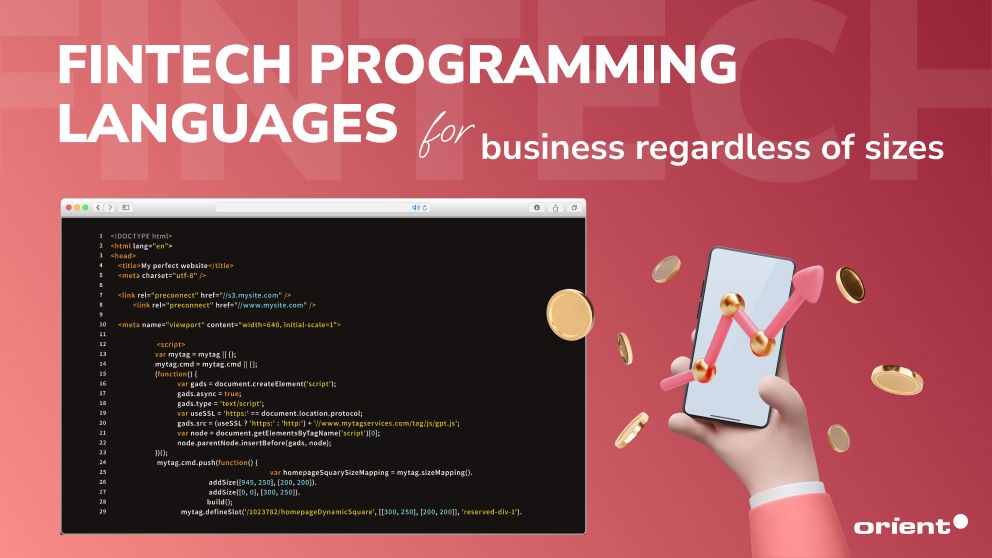Top Timeless Fintech Programming Languages for Business Regardless of Sizes

Content Map
More chaptersInformation technology appears in every corner of human life and gradually changes every industry in a more positive direction. IoT in supply chain reduces logistic bottlenecks. AI enhances efficiency in software testing. Big data improves customer experience in retail. Most especially, the development of technology has formed a completely new concept in the financial industry called fintech.
Over the past decades, the finance industry has experienced remarkable growth thanks to a wave of innovative financial software appearing across businesses regardless of size. By maximizing the power of financial technology in areas such as mobile apps, machine learning, blockchain, data analytics, cloud computing, etc., enterprises provide convenient solutions compared with traditional financial processes, making them more accessible and cost-effective for both individuals and businesses.
Because the market is highly competitive, not many financial solutions truly stand out amidst the challenged reality. Creating banking apps with C++ and Java was a popular choice for development teams in previous years. However, are these programming languages mentioned above relevant at present, when coding languages are always changing at breakneck speed due to industry need involvement?
Every language has its own pros and cons, and their constant improvement to avoid oblivion is undeniable. Below are some eternal fintech programming languages that may be helpful in your journey of building financial applications.
Required Characteristics of Programming Languages for Finance and Fintech Industry

Programming languages serve as the foundation for developing fintech applications and solutions. In addition to considering the potential of your business, there are several common characteristics of a programming language you need to consider before deciding to use since they directly affect the user experience.
Security
Due to the massive sensitive user financial data and transactions financial institutions deal with in fintech applications, programming languages used in this domain must put security first. Unlike other custom software products, the main purpose of customers when using banking apps is to solve finance and fintech-related problems such as transactions, bill payments, investment management, etc. Most of these tasks involve account details, personal identification information, and transaction history, which is an even more lucrative prey for hackers.
If not stored and managed carefully, this fertile source of information will easily become a main target for cybersecurity risks. The confidential information leakage at this time affects the user experience and exposes the business to legal issues if sued. This raises the paramount importance of robust security features in programming languages used in finance.
Speed and Performance
No one wants to use an application with low speed and performance for a long time. This statement is even more evident for the financial services industry. Money is quite a sensitive issue. That is why fintech operations often require quick response times and real-time processing. Customers who use financial mobile and desktop apps easily feel uncomfortable when faced with slowness and unresponsiveness. Letting this situation persist for a long time deeply affects user overall satisfaction. Meanwhile, fast programming languages enable smooth and responsive interfaces, leading to a better user experience.
Additionally, financial applications require the ability to perform complex activities such as risk management and data analysis during operation. In order to ensure efficient processing of large datasets and minimal latency when handling large volumes of data, it is crucial to utilize speedy programming languages.
Scalability
There are many reasons why payment systems need to be developed using scalable programming languages. By operating around customers, all financial applications today have to deal with vast amounts of data as customer needs increase over time. Choosing a scalable programming language ensures that the process of analyzing large datasets and distribution across multiple servers or cloud infrastructure goes smoothly without compromising performance.
The fintech industry is dynamic as factors such as evolving regulations, technology advancements, and market conditions are always changing to adapt to the socio-economic context depending on the period. Using a language that lacks scalability will not have much of an impact in the early stages. However, once the business requirement changes, it will hinder the business from changing, integrating, or updating features seamlessly. Therefore, programming languages that offer scalability and support for distributed computing are the best fit for finance and trading platforms.
Best Programming Languages for Fintech Software Development and Reasons for Choosing Them

You are familiar with JavaScript and Java as they are always mentioned as popular programming languages that make the success of many web development and mobile applications nowadays. However, technology trends are constantly evolving, and programming languages are regularly updated to meet the changing needs of users. Some languages are more commonly used at a certain time while some are not, and vice versa. The job of business owners and the development team is to coordinate closely with financial analysts to develop a suitable strategy for fintech products, including choosing the right programming languages. So, what are the other programming languages for finance besides Java?
Python
It’s not surprising that Python appears in the list of top programming languages for finance and fintech. Not only influential in the banking industry, but this coding language is commonly used for most fields and tech niches today, such as web application development, data science, scientific computing, etc. Accounting for 27.99% of the market share up to now, Python is favored by developers because of its simplicity and readability. Unlike some other programming languages, Python uses whitespace indentation to delimit code blocks instead of keywords and brackets.
Why is Python recommended in fintech?
- Cost-saving: Python is an open-source programming language, which means it is free to use and distribute. Businesses, including startups, can benefit from Python without investing heavily in licensing fees.
- Data Analysis and Visualization: The data processing capabilities make Python a perfect fit for analyzing and visualizing large financial datasets.
- Rapid Prototyping: Python allows rapid prototyping in fintech when testing and building new financial algorithms and models.
- Integration Capabilities: Python provides integration support with other platforms and languages, making connecting with existing financial systems and APIs easier.
Java
Java is an object-oriented programming language developed by Sun Microsystems in 1995. This language is designed with the criteria of user-friendliness, flexibility when able to run on many different operating systems without requiring code modifications, and scalability for possibly dealing with significant amounts of data. There are a number of large banks in the world applying this language to their financial-related platforms and systems, such as corporate banking portals, electronic trading platforms, and customer-facing applications. Even though it is more than 28 years old, and many other powerful languages have arisen along the way, Java is still a reliable choice for developers wishing to build fintech applications.
Why is Java recommended in fintech?
- Platform Independence: Java is an ideal choice for fintech applications that need to run on various operating systems as it has a cross-platform compatibility advantage.
- High Level of Security: Java offers built-in authentication mechanisms and security protocols, ensuring sensitive financial data is always safe and restricting unauthorized access.
- Reliability and Stability: With strong typing, strict adherence, and exception handling, Java helps developers develop robust and error-free fintech applications.
- Mature Ecosystem: Java possesses a vast array of open-source libraries and frameworks specialized for fintech development that help simplify the development of complex fintech applications.
C++
C++ is a programming language developed in the 1970s as an extension of C with improved external features and higher-level abstractions. Inheriting the outstanding features of C, C++ is both an object-oriented programming paradigm and procedural, supporting the development team to write efficient and modular code. This language is often used for security and reliability applications, including fintech solutions. In particular, businesses that engage in online stock trading and other economic assets using C++ will be effective in terms of performance and speed due to its low-latency programs.
Why is C++ recommended in fintech?
- High Performance and Efficiency: Not only does it have fast execution, but C++ also has the ability to handle large data volumes, which is very suitable for applications and tasks that require algorithmic trading or real-time calculations.
- Low-level Control: By directly manipulating memory and accessing hardware interfaces, C++ allows software engineers to optimize code for performance, which is crucial for complex financial calculations.
- Mathematical Libraries: C++, with its rich ecosystem of mathematical libraries, is a powerful tool supporting numerical methods and statistical analysis on fintech apps.
- Legacy Compatibility: Many existing fintech systems written in C give C++ a logical choice for compatibility and integration purposes.
SQL
SQL (Structured Query Language) is a programming language especially suitable for the finance and fintech industry because of its ability to manage and manipulate relational databases. Completely different from the general-purpose languages mentioned above, SQL is considered to be domain-specific and is only used to optimize the power of databases, such as supporting store data and making strategic analyses. In particular, SQL is mainly used as a fundamental part of statistical modeling for big projects and data processing platforms. As the volume of information on financial apps increases in parallel with the number of users, SQL increases its importance in the fintech industry.
Why is SQL recommended in fintech?
- Querying and Reporting: With powerful querying capabilities, SQL allows financial analysts to extract and aggregate large datasets efficiently, thereby generating complex reports and making necessary changes.
- Relational Data Management: Relational datasets management on SQL offers structured data storage and efficient querying capabilities, helping developers in dealing with complex business logic.
- Data Integrity and Consistency: SQL ensures data consistency and integrity by offering ACID (Atomicity, Consistency, Isolation, Durability) properties.
- Scalability and Performance: SQL can perform complex queries efficiently, making it possible to handle high transaction volumes and maintain system responsiveness.
JavaScript
JavaScript was developed in 1995 by Brendan Eich and has since become one of the most popular programming languages in the tech industry. Developers use JavaScript to enable interactivity and dynamic content on kinds of web pages, from adding functionality to websites to manipulating web page elements. While it is widely known for its use in frontend web development, JavaScript has expanded its presence in the fintech industry beyond just web applications. In fintech, JavaScript is specifically applied to build interactive web applications that improve user experience and integrate with APIs.
Why is JavaScript recommended in fintech?
- Mobile Development: JavaScript can help businesses reach more users on both iOS and Android platforms using a single codebase with frameworks like React Native and Ionic.
- API Integration: JavaScrpit can be used to integrate with APIs in fintech applications, enabling functionalities like account aggregation, payment processing, and data analysis.
- Server-side Development: By pairing with Node.js, JavaScript provides a scalable runtime environment and efficiently handles backend operations.
- Data Visualization: JavaScript libraries such as D3.js and Chart.js are widely used in fintech for visualizing financial data, enabling the creation of interactive charts, graphs, and dashboards.
Which Object-oriented Programming Language Best Suits Your Financial Trading Systems?
There is no one-size-fits-all programming language in the finance and fintech industry since different languages have their own strengths and specialization areas within the fintech domain. Instead of wondering the best language for your financial trading systems, considering and evaluating the personal needs, goals, and constraints of the project at hand is the most professional investment.
No matter which language you choose, remember that the development team’s level of expertise and skills is also one of the factors that strongly impact your decision. If the majority of your in-house developers have strong proficiency in one programming language, it may be a wise idea to leverage that expertise rather than introducing a new language. By doing so, businesses ensure product quality and optimize the availability of resources.
In case you do not have enough expertise in a language, consider outsourcing to software development companies with industry experts. Orient Software has experience building financial and fintech solutions with appropriate programming languages, in addition to providing various tech domain services with a track record of successful projects. As the market is increasingly expanding, let us give you a hand in creating a competitive advantage.







